This post may contain affiliate links. Please read our disclosure policy.
This Caramel Pastry Cream is smooth, creamy and full of caramel flavor. It is the perfect filling for tarts, classic puff pastry, cream puffs, éclairs or even as a twist on banana cream pie!
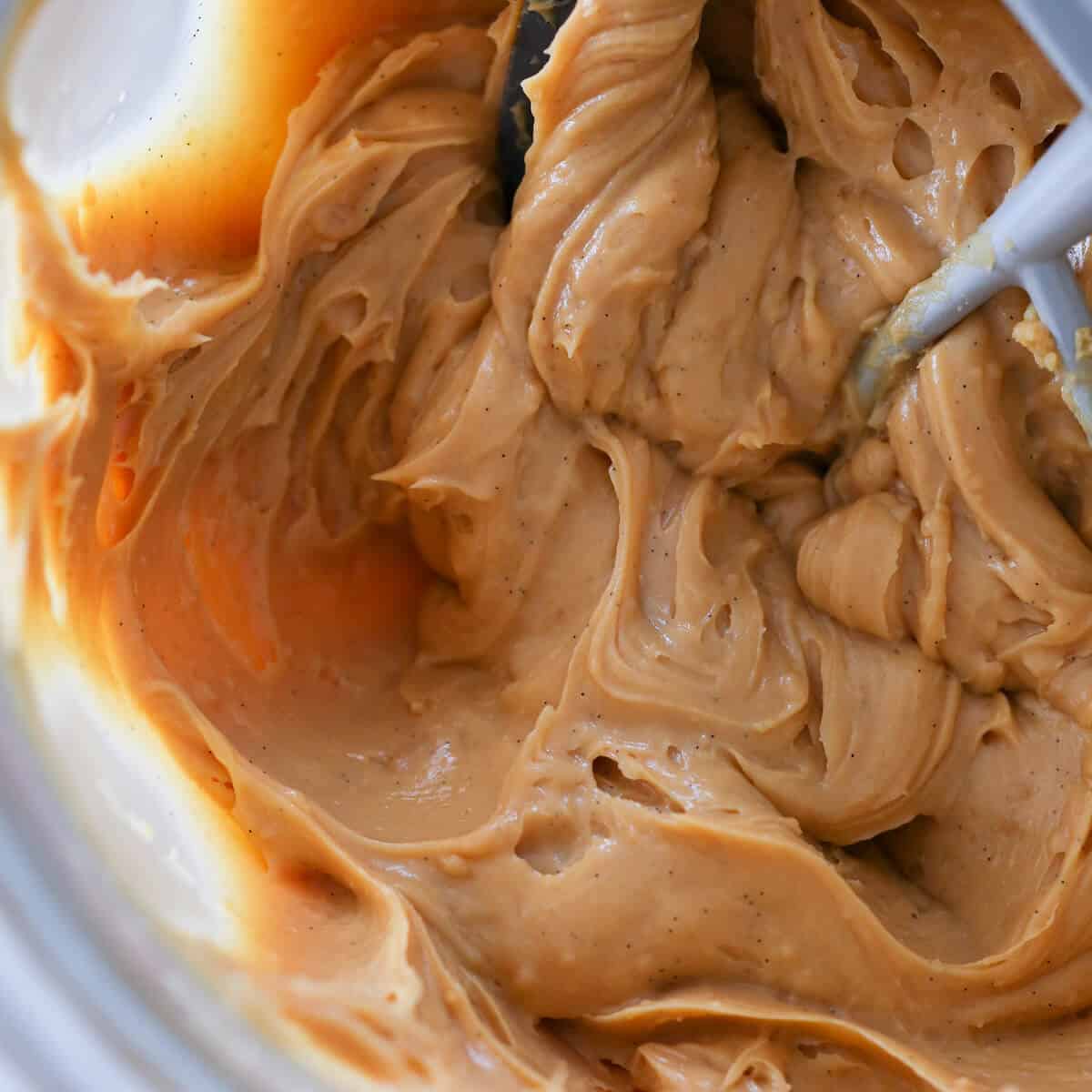
Pastry cream is one of the hardest working recipes in a baker’s arsenal! Just like almond cream, it can be baked into Danishes; used as a filling for tarts like this puff pastry fruit tart, éclairs, or profiteroles. Lightened it with whipped cream as a filling for trifles like this maple pumpkin trifle, donuts, parfaits or pies; or even used to make German buttercream!
This is a variation of my vanilla bean pastry cream, but instead of adding additional flavoring at the end, which is so expected, we are making the caramel from the very start! It is slightly less sweet and has a delicate caramel flavor. You can add more caramel sauce at the end while it is warm, if you want a more intense caramel flavor
Table of Contents
- Why you will love this recipe:
- My Professional Tips for a Lump Free Pastry Cream
- Ingredients
- How to Make Caramel Pastry Cream
- How to Prepare Pastry Cream for Use:
- Chef Lindsey’s Recipe Tip
- Ways to use Caramel Pastry Cream
- How to store caramel pastry cream?
- Frequently Asked Questions
- Caramel Pastry Cream Recipe
- Before You Go!
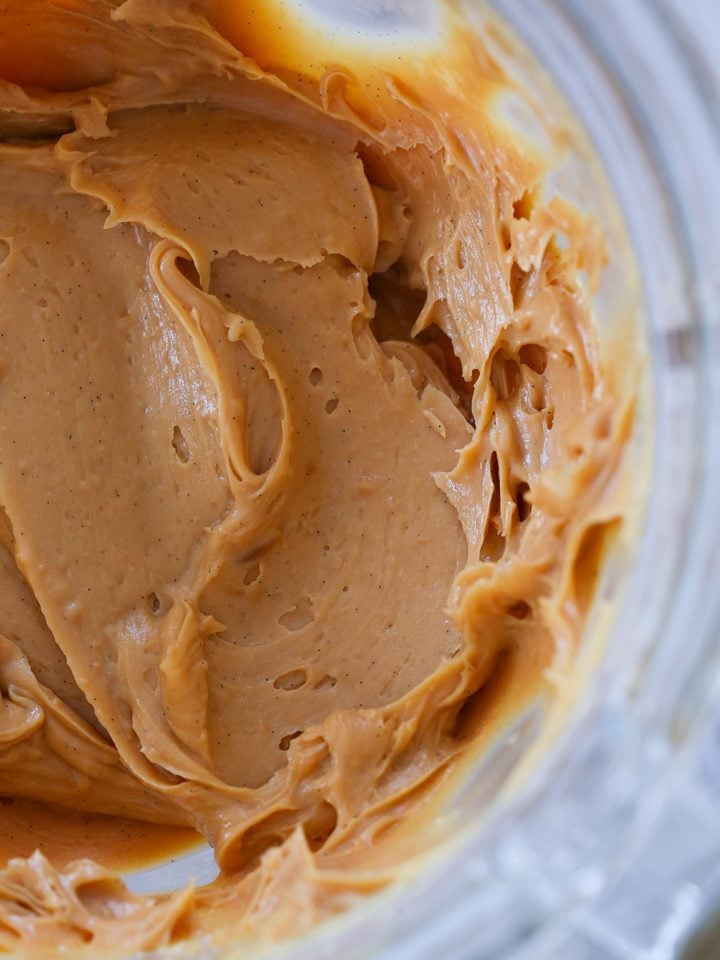
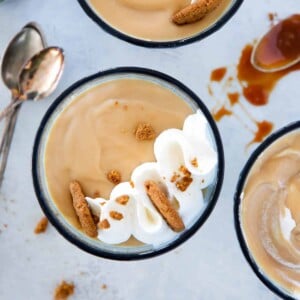
Why you will love this recipe:
- Big caramel flavor. We start the recipe by making a dry caramel rather than adding caramel sauce at the end. This ensures that the salted crème patissière is lightly sweetened with a big caramel flavor.
- Easy to follow instructions. Sometimes the simplest recipes are the most challenging because it is all about perfect execution. I will give you all my best tips to help you make a smooth, lump-free and flavorful caramel pastry cream!
- The perfect hold. Like using just the right hair-spray for your daily coiffure, just the right ratio of cornstarch and eggs are critical in pastry cream. Too little and it will be loose, but too much and it will affect the flavor and leak moisture faster!
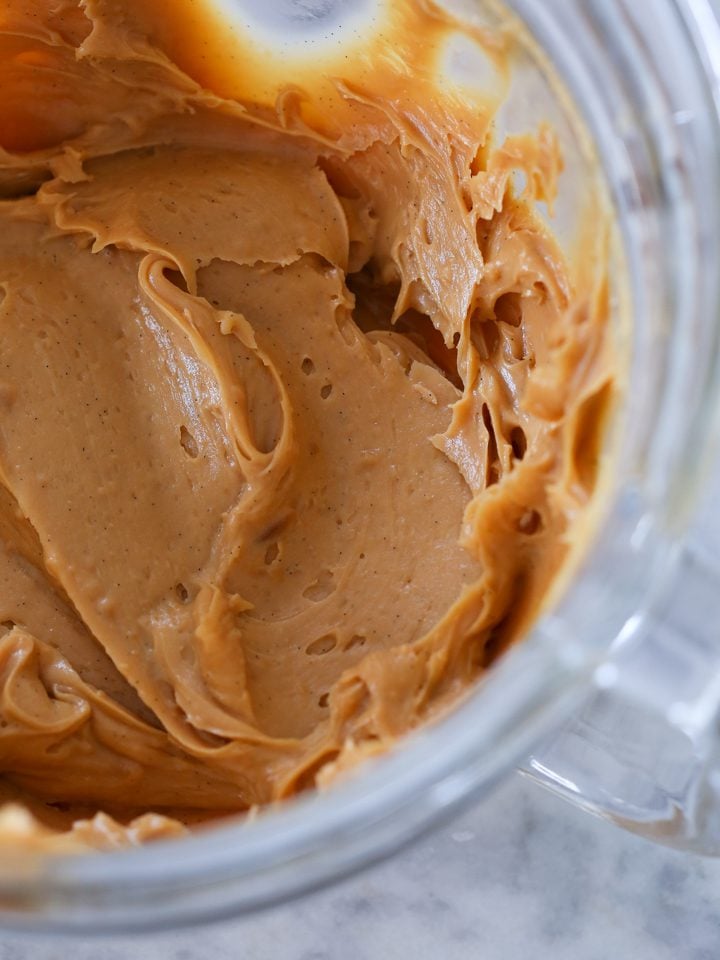
My Professional Tips for a Lump Free Pastry Cream
Along with burning or undercooking it, lumps are a common downfall. There are a few stages where you need to be on high-lump-alert!
- Whisk cornstarch with the eggs and sugar. This will help keep the egg proteins from denaturing in the presence of sugar and also keep the cornstarch from clumping!
- When you temper your milk into the eggs, slowly, and in a controlled fashion, add the hot milk while whisking. This allows the eggs to come up to the temperature of the milk without cooking them.
- While the pastry cream is cooking: Whisk constantly! Do not allow bits of pastry cream to coagulate and then burn. Don’t forget the edges of the pot!
- Overcooking: if you overcook your pastry cream or you cook it at too high of a heat, you will get lumps.
- Cool it quickly! I pour mine out on a plastic wrap lined baking sheet, spread it out, then cover it with plastic wrap so it doesn’t develop a skin. Poke some holes in the top plastic to let the steam escape and then pop it in the refrigerator!
Ingredients
- Granulated Sugar: Sugar has many functions in this recipe. It adds sweetness; it protects the milk from scorching; it protects the eggs from the hot milk when tempering; AND it melts and caramelizes to form the base flavor for this pastry cream.
- Cornstarch: Cornstarch is a thickener like the eggs and it helps bind all the ingredients together when cooked. In a starch activated, stirred custard like this one, it also protects the eggs while the custard boils. In a stirred custard without cornstarch, like lemon curd, for example, boiling means lumps!
- Whole Egg: The egg in a stirred custard is integral to thickening the custard. Whisking it first with the sugar protects it from the heat.
- Egg Yolk: Eggs yolks in a stirred custard are also thickeners like the whole eggs but they add more fat than the whole egg without the added moisture from the whites. This makes a thick, rich custard. To many yolks will make it taste “eggy”
- Whole Milk: The milk is the liquid in pastry cream. The fat does add flavor but isn’t essential like it is in some recipes, so feel free to use your favorite alternative or lower fat milk.
- Vanilla Bean: Vanilla beans are one of the most expensive ingredients on Earth, but they add an unmistakable flavor.
This recipe is the perfect use for a “spent” pod. If you scraped out the seeds for another recipe like these vanilla marshmallows with egg whites or to flavor an Italian meringue buttercream.
How to Make Caramel Pastry Cream
Use these instructions to make the perfect caramel pastry cream every time! Further details and measurements can be found in the recipe card below!
Make caramel for custard
Before you begin, measure all your ingredients and have them ready to go. Set up a landing spot for the finished custard. Line a rimmed baking sheet with plastic wrap or set out a large bowl. Pastry cream isn’t difficult but it does require a little bit of timing.
Step 1: In a heavy bottomed sauce pot, stir together milk, 1/3 cup sugar and vanilla bean pod. Heat over medium heat until warm. Set aside.
Step 2: In a second pot, preferably with sides that are at least 4 inches deep (for safety and ease of whisking), add the 1 ¾ cup sugar designated for the caramel. Heat over medium-high heat. The sugar will melt unevenly, so stir gently a few times to redistribute the melting sugar. It is okay to stir a dry caramel. Stirring too much will create clumps that will never melt. You can strain these out if desired.
Step 3: When the caramel has turned a dark amber color and just starts to smoke, slowly pour the warmed milk mixture into the caramel. Be careful, it will splatter and pop. Heat over medium until the caramel has incorporated into the milk. If you have stubborn lumps of sugar, strain them out into another bowl and then pour the caramel milk back into the pot.
Prepare caramel pastry cream
Step 4: In a large bowl whisk together eggs, yolks and remaining sugar until pale yellow and doubled in volume. Whisk in cornstarch.
Step 5: Bring caramel milk to a boil and slowly pour the milk into the egg mixture while whisking constantly. Adding a little at a time will slowly bring your eggs up to the temperature of the milk without scrambling them. Pour the egg milk mixture back into the pot and return to the stove top.
Choose a whisk that will get into the corners of your pot. I prefer a French (straight) whisk for this job because it will allow you to cover the surface area and get into the corners. This keeps the custard from getting stuck around the edges and clumping.
Step 6: Whisk over medium heat until it begins to thicken and comes to a boil. Continue whisking 1 minute as the custard boils. This activates the cornstarch and cooks out the raw starch flavor.
Step 7: Pour hot custard out onto prepared baking sheet or bowl, cover the surface with a sheet of plastic wrap, poke a few holes and refrigerate.
Emergency Lump Removal: If you did happen to get a few lumps, press it through a fine mesh sieve onto the baking sheet or into the bowl while hot. Use a ladle or silicone spatula to help!
How to Prepare Pastry Cream for Use:
Before you use pastry cream, you need to “refresh it” or “condition” it. All this means is you need to beat it so that it becomes smooth and silky. This won’t get any lumps out but it will create a more pleasant product to eat and work with.
Place the desired amount of pastry cream in a stand mixer fitted with the paddle attachment. Beat on medium-high speed until smooth. You don’t want to beat it too long or it will loosen and the cornstarch will lose some of its hold and it will not firm back up when chilled. This can lead to loose, unruly fillings.
Chef Lindsey’s Recipe Tip
Just keep whisking! I know it seems to come to a boil just when your arm feels like it is going to fall off, but I promise that you can whisk just one minute more! It is tempting to cut it short but that will lead to a starchy flavor and texture as well as a looser pastry cream.
Ways to use Caramel Pastry Cream
- Donuts: I originally developed this recipe for a donut filling. You can loosen the pastry cream, transfer to a piping bag, poke a hole in a yeasted donut (this recipe for filled donuts will work beautifully), insert the piping bag into the hole and squeeze until it starts coming back out!
- Tart Fillings: Spread a layer onto a puff pastry fruit tart for a nice flavor variation or use it in a baked sweet tart crust along with your favorite sliced, seasonal fruits! Berries, apple compote or even bananas!
- Banana Cream Pie: Swap caramel pastry cream for the vanilla pastry cream in my banana cream pie recipe for an easy and incredibly flavorful twist!
- Pastries: Use as a filling for cream puffs, Danishes, éclairs, or mille-feuille.
- Trifles or Parfaits: For an easy dessert, fold equal parts (by weight) pastry cream and whipped cream (soft peaks) together and use as a layer in trifles or parfaits. Add cubes of sour cream pound cake, pumpkin bundt cake, or even red velvet pound cake along with your favorite fruits!
For even more caramel flavor, add up to ½ cup salted caramel sauce to the pastry cream while it is is still warm. The more you add, the looser the custard will be.
How to store caramel pastry cream?
Store caramel pastry cream in an airtight container in the refrigerator for up to one week. It will begin to leach moisture after a few days. This is normal. It will separate less if stored in one layer like on a baking sheet covered in plastic wrap verses mounded in a storage container.
Frequently Asked Questions
I do not recommend freezing pastry cream.
You can make as a large a batch as your pot can hold and your whisking arm can handle!
Before you use pastry cream, you need to “refresh it” or “condition” it. All this means is you need to beat it so that it becomes smooth and silky. This won’t get any lumps out but it will create a more pleasant product to eat and work with. Don’t try folding unconditioned pastry cream into whipped cream. It’s misery and you will have chunks.
You can condition it with a stand mixer or by hand in a bowl with a rubber spatula.
The most common culprits of a lumpy pastry cream are improperly adding the cornstarch or not whisking properly while cooking. Whisk the cornstarch in with the eggs and sugar to evenly distribute it and keep it from clumping when heated. Choose a whisk that will get into the corners of your pot. This keeps the custard from getting stuck around the edges and clumping.
If you followed the recipe, then the only reason pastry cream can be runny is if it wasn’t cooked long enough to activate the cornstarch. It must continue to cook for one minute after it reaches a rolling boil.
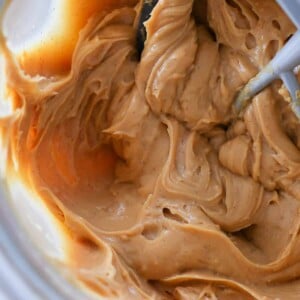
Caramel Pastry Cream
Ingredients
- 1 ¾ cup granulated sugar for caramel
- 4 cups whole milk 1 quart
- 1 vanilla bean split and scraped
- ⅓ cup granulated sugar for milk mixture
- ⅓ cup granulated sugar for egg mixture
- 2 whole eggs
- 4 yolks
- 10 tbsp Cornstarch ½ cup + 2 tbsp
Instructions
- Before you begin, measure all your ingredients and have them ready to go. Set up a landing spot for the finished custard. Line a rimmed baking sheet with plastic wrap or set out a large bowl. Pastry cream isn’t difficult but it does require a little bit of timing.
Prepare the caramel
- In a heavy bottomed sauce pot, stir together milk, 1/3 cup sugar and vanilla bean pod. Heat over medium heat until warm. Set aside.
- In a second pot, preferably with sides that are at least 4 inches deep (for safety and ease of whisking), add the 1 ¾ cup sugar designated for the caramel. Heat over medium-high heat. The sugar will melt unevenly, so stir gently a few times to redistribute the melting sugar. It is okay to stir a dry caramel. Stirring too much will create clumps that will never melt. You can strain these out if desired.
- When the caramel has turned a dark amber color and just starts to smoke, slowly pour the warmed milk mixture into the caramel.Be careful, it will splatter and pop. Heat over medium until the caramel has incorporated into the milk. If you have stubborn lumps of sugar, strain them out into another bowl and then pour the caramel milk back into the pot.
Prepare Pastry Cream:
- In a large bowl whisk together eggs, yolks and remaining sugar until pale yellow and doubled in volume. Whisk in cornstarch
- Bring caramel milk to a boil and slowly pour the milk into the egg mixture while whisking constantly. Adding a little at a time will slowly bring your eggs up to the temperature of the milk without scrambling them. Pour the egg milk mixture back into the pot and return to the stove top.
- Tip: Choose a whisk that will get into the corners of your pot. I prefer a French (straight) whisk for this job because it will allow you to cover the surface area and get into the corners. This keeps the custard from getting stuck around the edges and clumping.
- Whisk over medium heat until it begins tothicken and comes to a boil. Continue whisking 1 minute as the custard boils.This activates the cornstarch and cooks out the raw starch flavor.
- Pour hot custard out onto prepared baking sheet or bowl, cover the surface with a sheet of plastic wrap, poke a few holes and refrigerate.
- Emergency Lump Removal: If you did happen to get a few lumps, press it through a fine mesh sieve onto the baking sheet or into the bowl while hot. Use a ladle or silicone spatula to help!
How to Prepare Pastry Cream for Use:
- Before you use pastry cream, you need to “refresh it” or “condition” it. All this means is you need to beat it so that it becomes smooth and silky. This won’t get any lumps out but it will create a more pleasant product to eat and work with.
- Place the desired amount of pastry cream in a stand mixer fitted with the paddle attachment. Beat on medium-high speed until smooth. You don’t want to beat it too long or it will loosen and the cornstarch will lose some of its hold and it will not firm back up when chilled. This can lead to loose, unruly fillings.
Notes
Nutrition
Before You Go!
I hope you enjoyed this professional chef tested recipe. Check out our other chef-developed Custard Recipes!
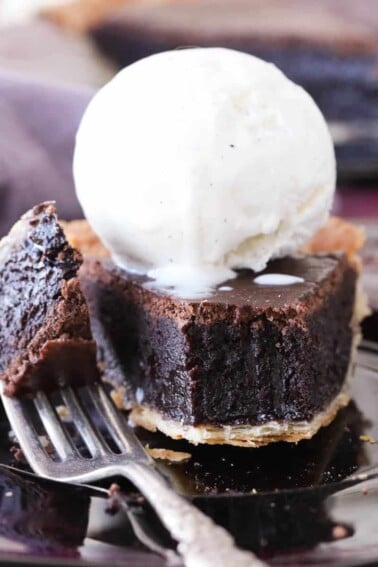
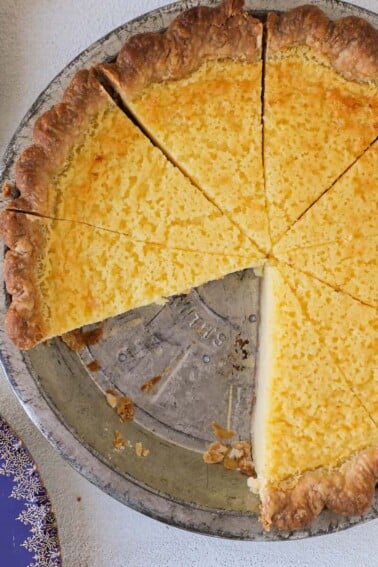
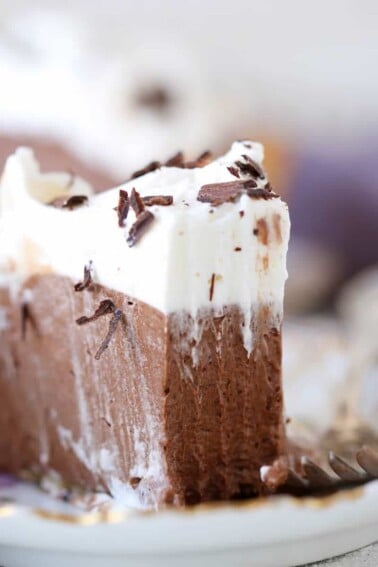
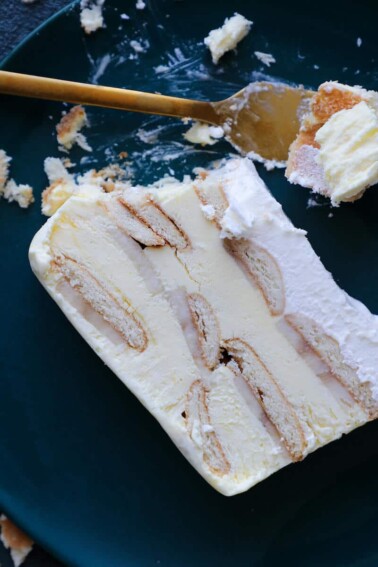








Hi chef
I would like to make a firmer cream, can I add more cornflour to make it firmer? Thanks
You can but just be aware that adding more cornstarch will only strengthen the bond temporarily and it will actually leach faster. Learned this the hard way 😉 Bottom Line: Add up to an additional 50g but I would only do that if you plan to use it up in 3 days. It will be substantially more stiff.
Thanks chef.
Will try it out. Thanks again
You got it, Angel! Enjoy!
Hi!
I thought pastry creams typically have butter. Does your recipe not require butter at the end?
Hi Sarah! This particular pastry cream recipe does not call for butter.
I see what you mean by adding a little additional caramel sauce at the end if a more intense caramel flavor is desired, so let me explain!
You do not need to have butter in your caramel at all so it is not included in my pastry cream.
However, if you follow my Salted Caramel Sauce recipe to add additional caramel sauce at the end, you will find butter in that recipe. This is because I do like to add a little butter to my caramel sauces. There are 3 reasons to I put butter in my caramel sauce: it makes the sauce looser, adds flavor and creates a silky mouthfeel.
Hope that clears it up, and I can’t wait to hear about what you make!